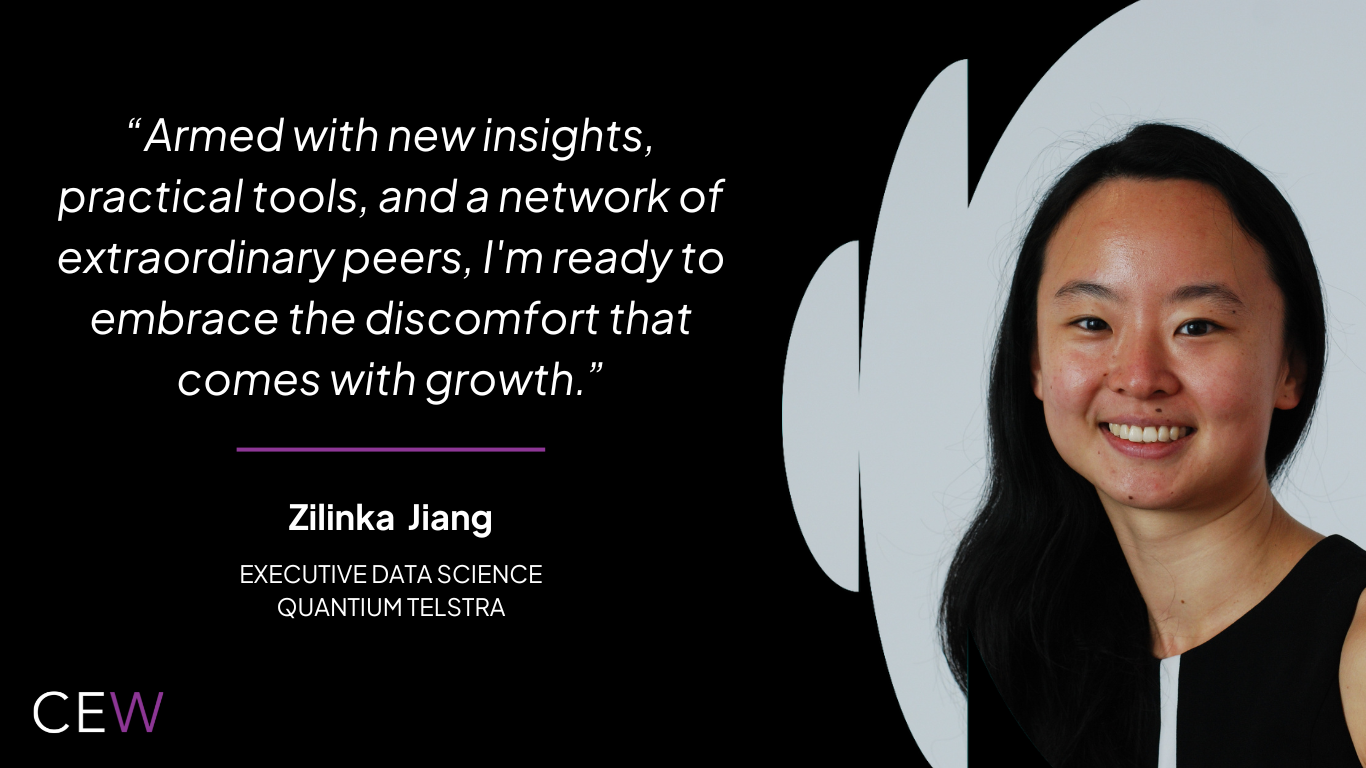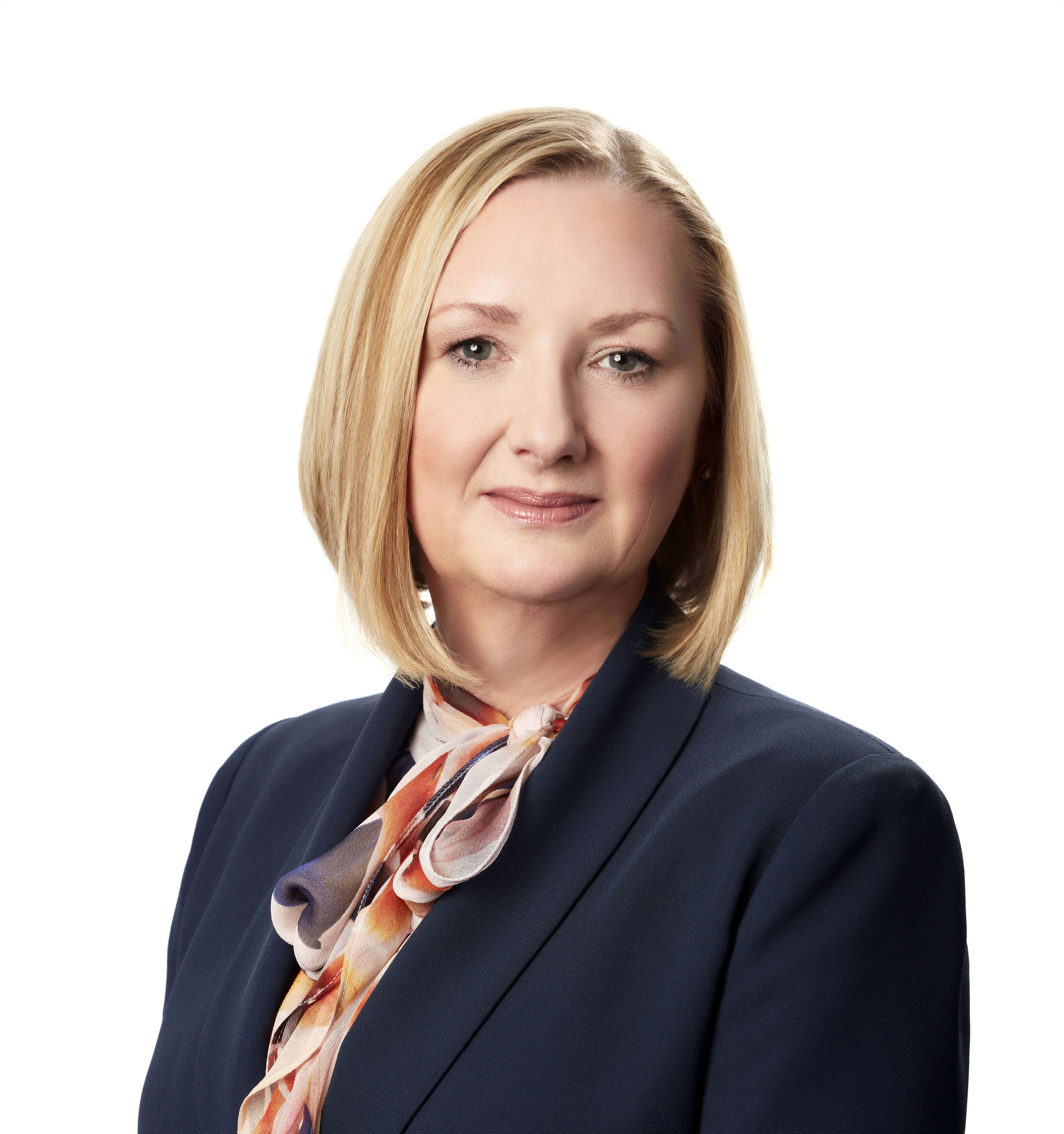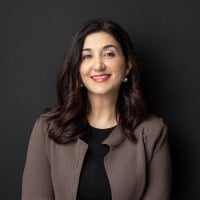Leadership, Learning, and Life-Changing Moments: My Stanford Journey
.png?width=1366&height=768&name=Zilinka%20Jiang%20Blog%20Post%20(1).png)
Since 2023, CEW has partnered with the Actuaries Institute to offer the Actuaries Institute Women Leaders in Data Science and AI Scholarship. Valued at $25,000, the scholarship is awarded to one senior level woman working in data science or AI specifically, who has at least three years’ senior executive experiences within this sector as part of their overall career. The chosen Scholar attends an Executive Education course at one of the most prestigious business schools in the world – INSEAD, Saïd Business School, or Stanford Graduate School of Business – to accelerate her leadership journey.
In this blog, our 2024 Scholar Zilinka Jiang reflects on her experience studying The Executive Program in Leadership: The Effective Use of Power at Stanford Graduate School of Business.
There's something magical about being a student again. Last week, I found myself walking among Stanford’s iconic palm trees, notebook in hand, feeling equal parts excited and apprehensive about what lay ahead. Now, fresh from their Executive Program in Leadership: The Effective Use of Power, I’m buzzing with insights I can’t wait to share.
The Power of Collective Wisdom
You know what’s fascinating about leadership challenges? They’re remarkably universal. I was surrounded by leaders from 20 countries and every industry you can imagine, expecting vastly different experiences. Instead, I found myself nodding as a Head of Product from Indonesia described the exact team dynamics my team have been wrestling with. These moments of connection, realising you’re not alone in your challenges and sharing solutions, were invaluable.
The program struck a balance between theory and practical application. Rather than drowning in abstract concepts and theories we were constantly putting our learning into action through hands-on exercises and workshopping how to apply to our next big challenges. Theory is great, but it doesn’t resonate the same way. On the last day, I was lucky enough to be allocated the role of a senior manager in a whole of group team exercise. In between thinking that I was a terrible leader and should quit my day job and moments of great coordination and triumph, I learnt an extraordinary amount about myself and my default leadership style.
Learning from Stanford’s Finest
What sets Stanford's faculty apart isn't just their academic brilliance – it's their ability to make complex ideas seem like common sense. Each professor brought their own flavour of wisdom to the table and challenged our assumptions and expanded our horizons in ways I never expected.
Professor Matt Abrahams transformed how I think about communication. His "CASE" framework stripped away the mystery around effective presentations. But one insight hit too close to home: "You know too much and care too much about what you communicate.” I can’t count the number of times my excitement over a subject has only confused everyone I speak to. "The only antidote is curiosity and empathy" is going to be my new mantra.
Professor Lori Nishiura Mackenzie's sessions on psychological safety and inclusive leadership were truly eye-opening. Rather than just advocating for diversity, she showed us how small shifts in language and behaviour can create massive impacts over time. I can’t wait to try her ‘speak last’ technique in our solution design sessions – imagine the perspective we might uncover when everyone feels heard.
Then came Professor Jeffrey Pfeffer, who might be the most brutally honest person I’ve ever met when it comes to talking about power. Most leadership programs shy away from discussing power, he tackled it head-on with refreshing (and sometimes confronting!) candour. I need to be reminded to “get out of my own way”, and not let the social narratives in my head stop me from asking. His overarching message was: power isn’t inherently good or evil – it’s a tool, and good people need to understand power to make positive change happen.
Equally transformative was Professor Huggy Rao, who challenged everything I thought I knew about scaling excellence. In a world obsessed with doing more, he dared us to do less. Through stories like the Hawaii Pacific Health hospital's brilliantly named "don't do stupid stuff" campaign, he showed how elimination often beats addition. My first week back, I'm planning to channel my inner Huggy and make a RidicuList to stop doing - who's with me?
Brian Lowery's session on influence without authority felt like it was written specifically for me. As often the only woman, the only data scientist, or the only consultant in the room, his insights about slowing down conversations to invite curiosity hit home. "The strength of an argument isn't about the argument itself," he told us, "it's about the audience's experience of it." That's going straight into my leadership playbook.
Beyond the Classroom
Some of the biggest insights happened between sessions, usually over amazing meals (thank you, Chef Raul!). If leadership is about nurturing growth, Raul definitely got the memo – though my waistline might have some complaints about his dedication to excellence!
Looking Forward
As I pack up my notebook and head home, I'm struck by how this program has been able to both consolidate and add to my perspective of leadership. It's not just about the frameworks and theories, it's about finding the balance between power and influence, between adding and subtracting, between speaking and listening.
The real test starts now. But armed with new insights, practical tools, and a network of extraordinary peers, I'm ready to embrace the discomfort that comes with growth. Because ultimately, this isn't just about becoming a better leader – it's about creating positive change for the broader community of women in Data Science.
And yes, I might need to invest in some new pants. But that seems a small price to pay for such a transformative experience.
Has anyone else attended similar leadership programs? I'd love to hear about your experiences and key takeaways.
Since 1992, CEW scholarships have supported more than 300 exceptional women to accelerate their progression to executive leadership. Zilinka attended Stanford as the 2024 Actuaries Institute Women Leaders in Data Science and AI Scholar. You can learn more about the work of the Actuaries Institute here, and about CEW’s Scholarship Program here.
From the blog


